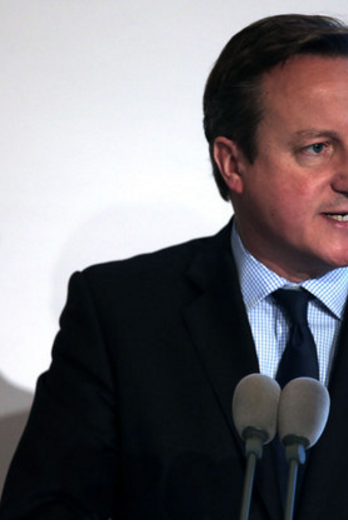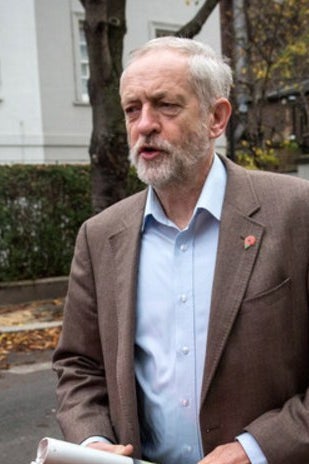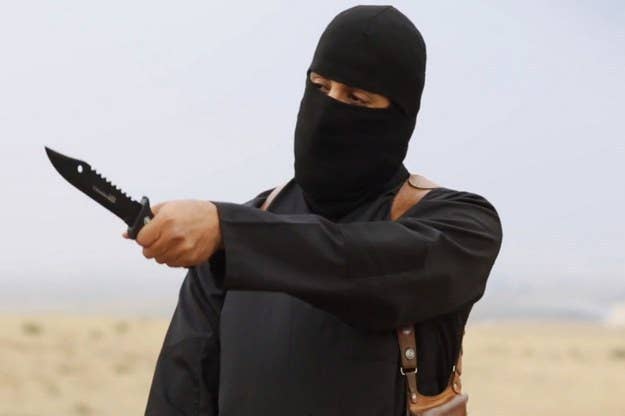

David Cameron has branded Jeremy Corbyn a fantasist for saying ISIS killer Mohammed Emwazi, also known as "Jihadi John", should have faced the courts rather than be attacked.
The prime minister hit out at the Labour leader four days after Emwazi, who first gained notoriety when he killed American journalist James Foley last year, was targeted in a drone strike in Raqqa, Syria. US authorities say they are "reasonably certain" he is dead.
Cameron's speech to the Lord Mayor's Banquet in London also followed the terror attacks in Paris on Friday night, which killed at least 129 people. ISIS has claimed responsibility.
The PM strongly defended the US airstrike that hit Emwazi – accusing Corbyn of not getting "the reality of the world we are in". He also defended drone attacks against British ISIS fighters Reyaad Khan and Junaid Hussain, who were killed in August.
Corbyn declared on Friday that although Emwazi had been "held to account for his callous and brutal crimes", it would have been "far better for us all if he had been held to account in a court of law". On Monday he also questioned the legality of the drone strike, telling ITV News: "I am awaiting an explanation of where the legal basis was for that incident that went on."
In his speech, Cameron said: "We have to be realistic and hard-headed about the threats we face: Confronting this murderous violence requires a strong security response. Those who say we should have somehow arrested Jihadi John don't get the reality of the world we are in. The same is true of Junaid Hussain or Reyaad Khan.
"There is no government we can work with in Syria, let alone that part of Syria. There are no rigorous police investigations or independent courts upholding justice in Raqqa. We have no military on the ground to detain those preparing plots.
"And there was nothing to suggest that any of these people would ever leave Syria or stop planning to murder British and American citizens. In that situation, you do not protect people by sitting around and wishing for another world. You have to act in this one. And that means being prepared to use military force where necessary."

Cameron's speech came hours after Corbyn was criticised by his own MPs at a meeting of the parliamentary Labour party (PLP) over his stance on Emwazi and on whether police should be allowed to "shoot to kill".
Corbyn had told the BBC: "I'm not happy with the shoot-to-kill policy in general, I think that is quite dangerous and I think can often be counter-productive."
According to Labour MPs at the meeting, Corbyn refused to answer questions about whether terrorists wielding Kalashnikovs on British streets should be shot by the police. One MP told journalists they had "never seen that level of discontent" at a PLP meeting before.
But Corbyn's spokesman insisted it was "not about the leader of the party being shouted down by the mainstream of the PLP" – instead pointing to a "minority" of MPs who sought to "express themselves volubly".
Meanwhile in his speech, the prime minister warned it was wrong to dismiss the link between ISIS extremists and the religion of Islam.
"It is not good enough to say simply that Islam is a religion of peace and then deny any connection between the religion of Islam and the extremists because these extremists are self-identifying as Muslims," he said.
"From Tunisia to the streets of Paris, these murderers all spout the same twisted narrative that claims to be based on a particular faith.
"To deny that is to disempower the critical reforming voices that want to challenge the scriptural basis on which extremists claim to be acting – the voices that are crucial in providing an alternative worldview that could stop a teenager's slide along the spectrum of extremism."
The PM also defended his decision to roll out the red carpet to the leaders of India, China, and Egypt in recent weeks. He said the invitations were vital to ensure Britain had "influence" in the world.
"Is anyone really saying that I shouldn't talk to the Egyptians on the day after an airliner is blown up in their country and when it is Britain's national interest that we support their airport security and get our own people safely home?" Cameron said.
"The people who wanted me to raise the dumping of cheap steel with the Chinese are also often the same people who say I shouldn't meet the Chinese. Well, I can't raise the issue if I'm not talking to them, just as we can't influence their rise in the world if we're not willing to engage."
